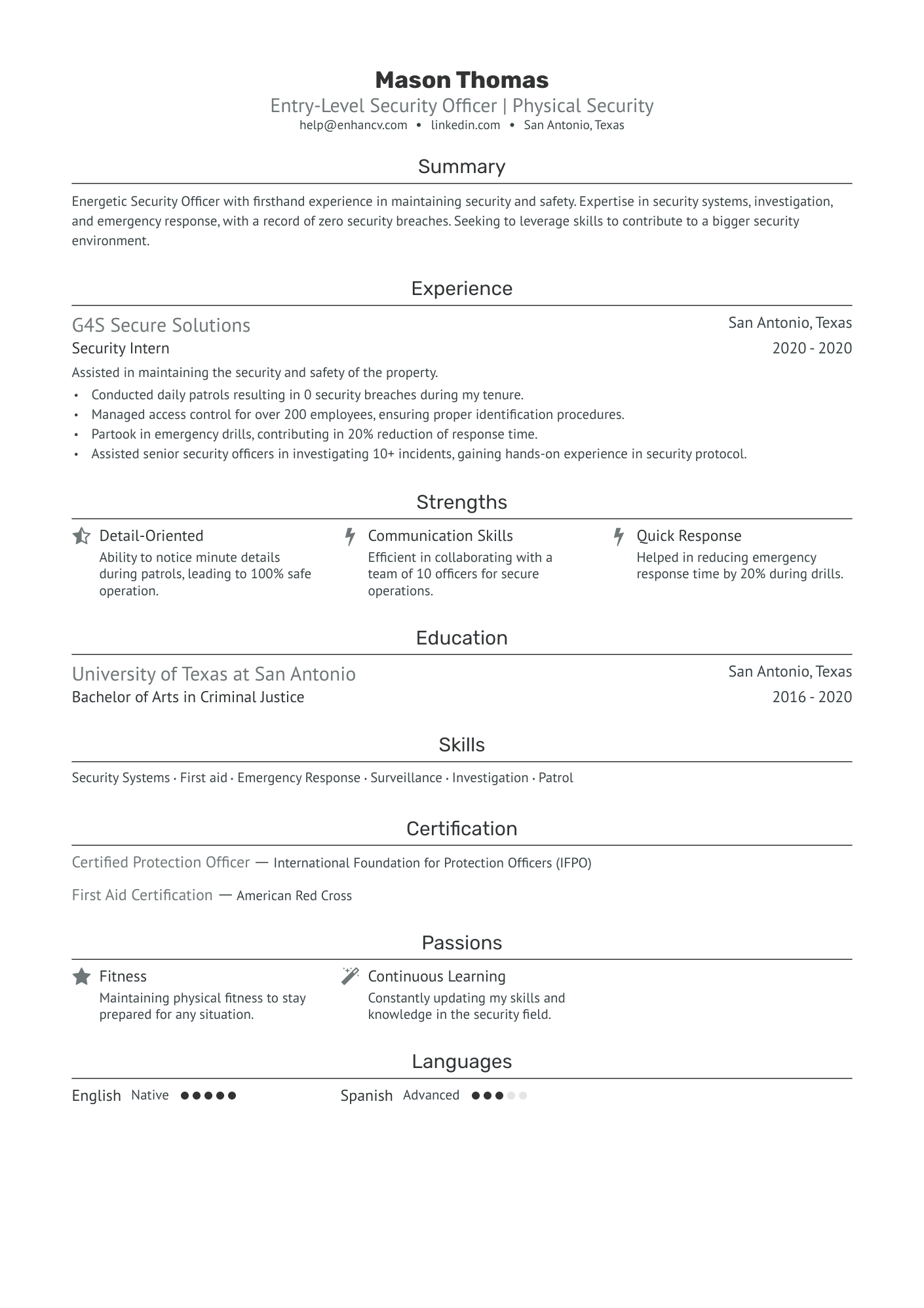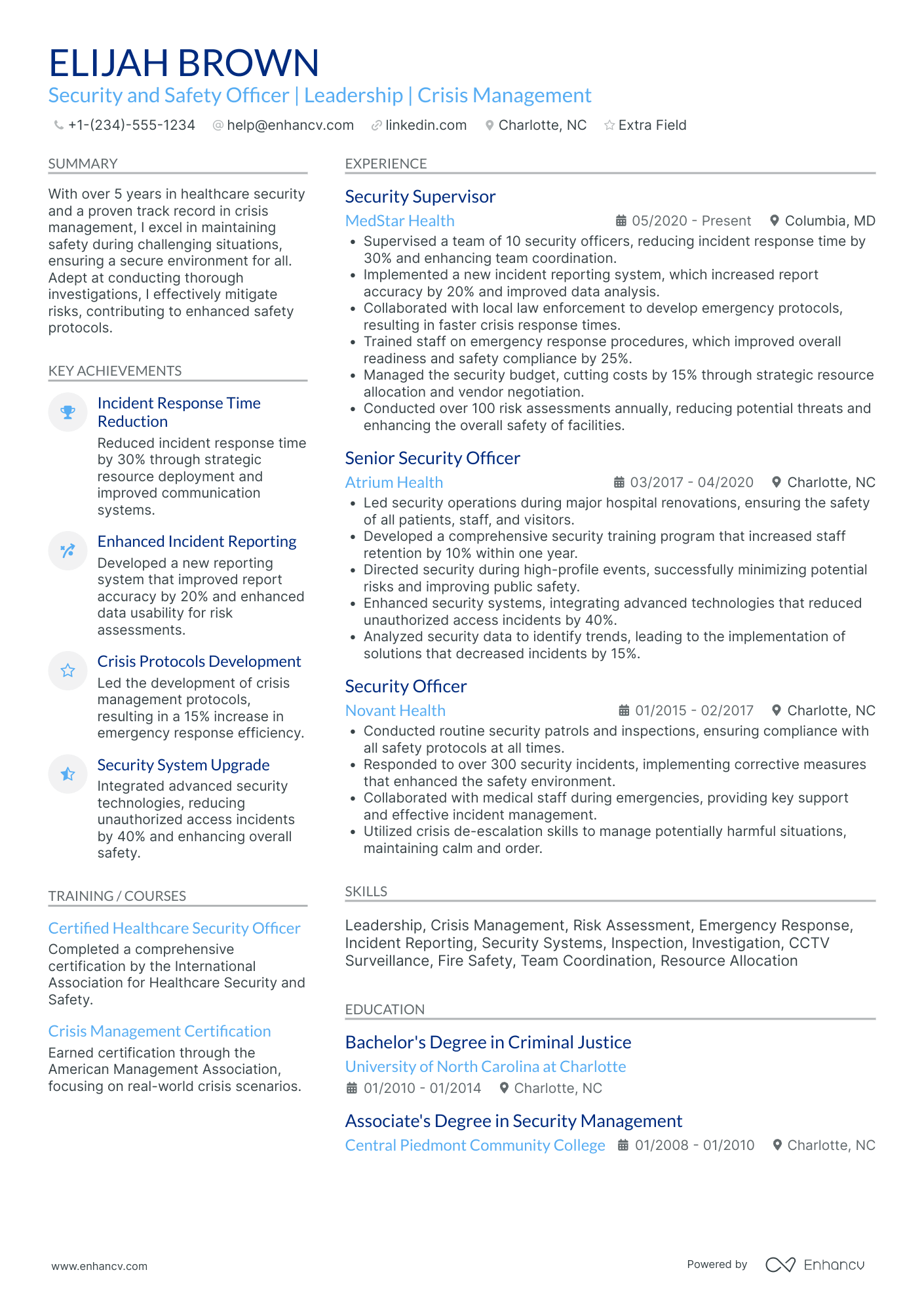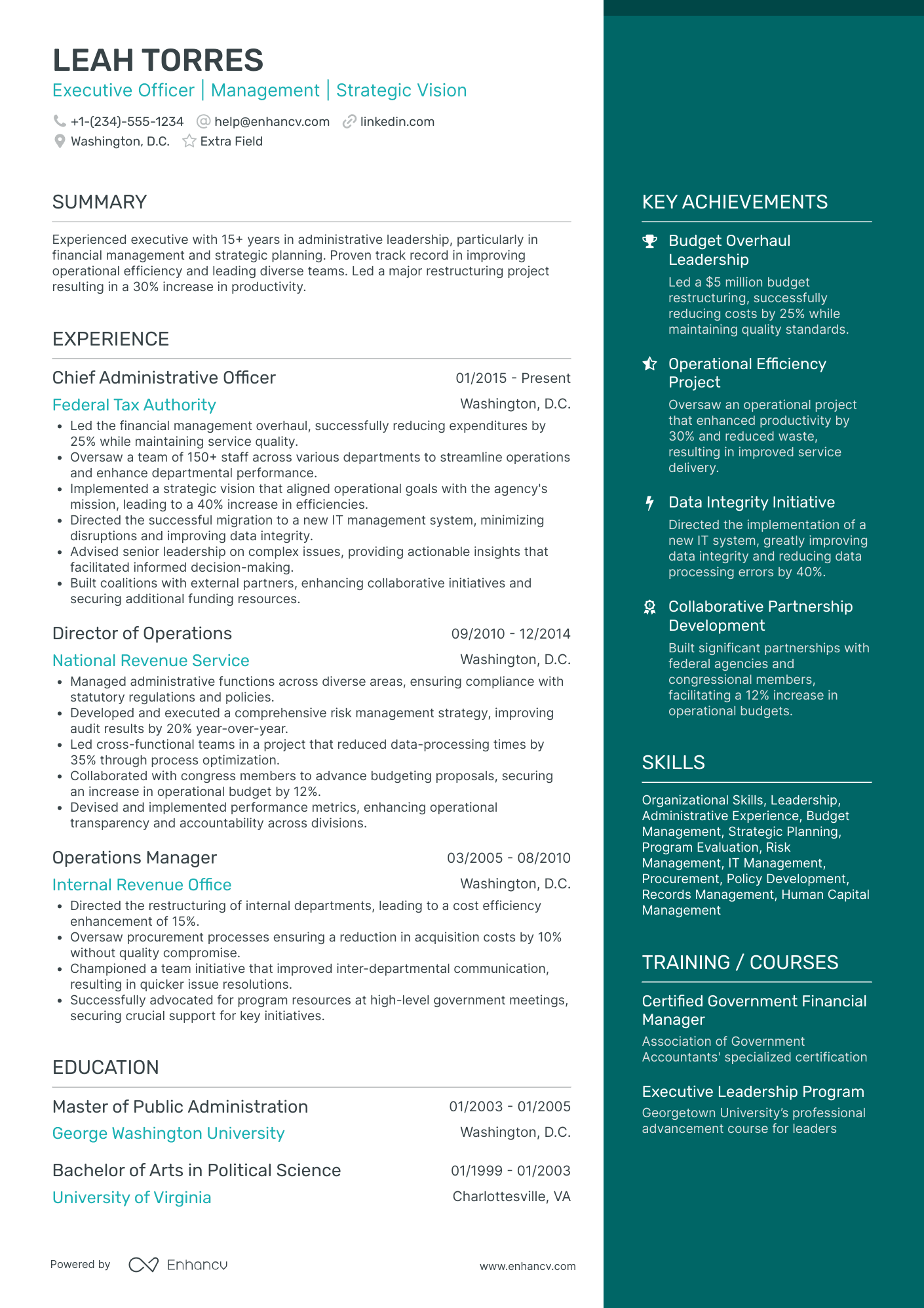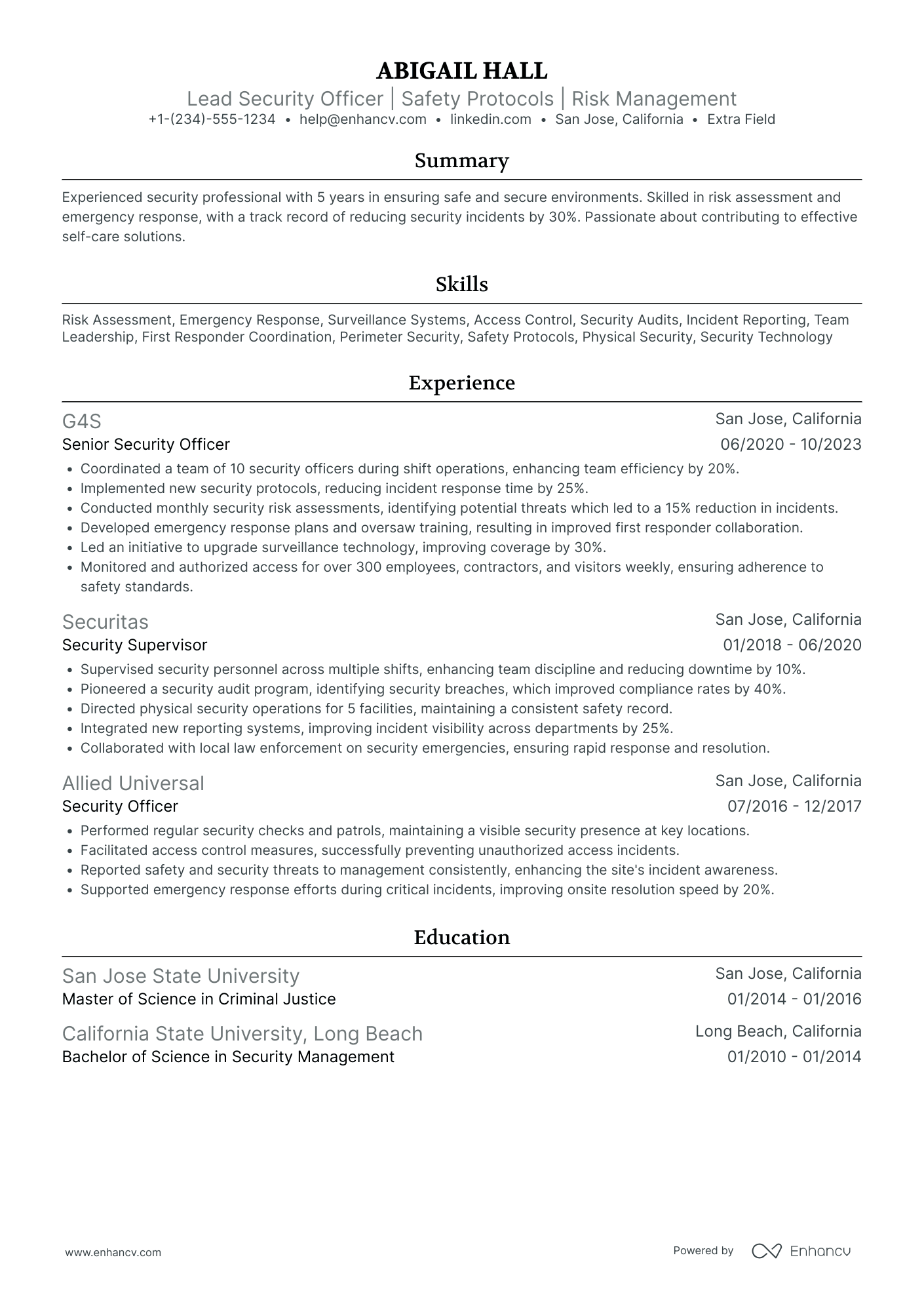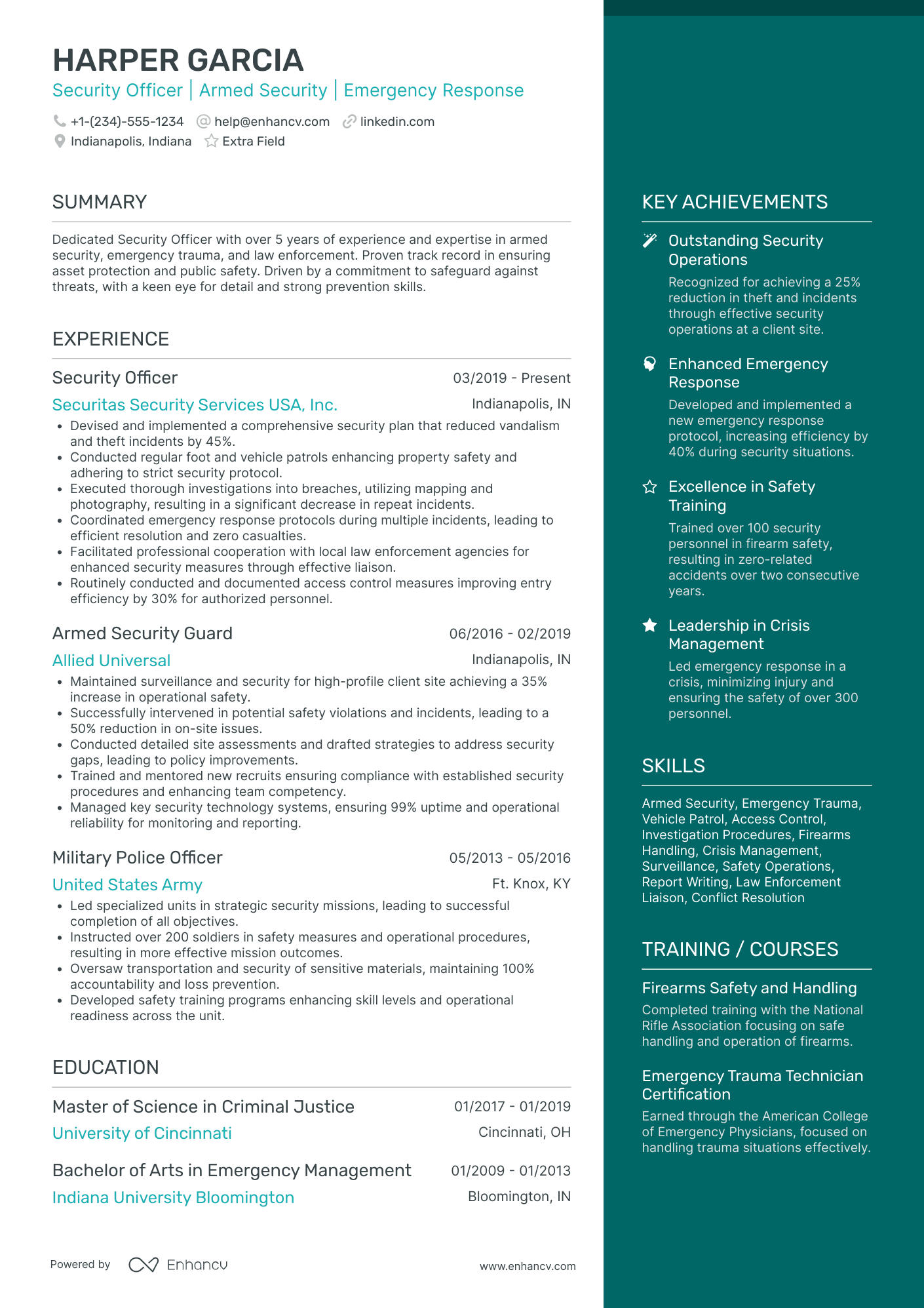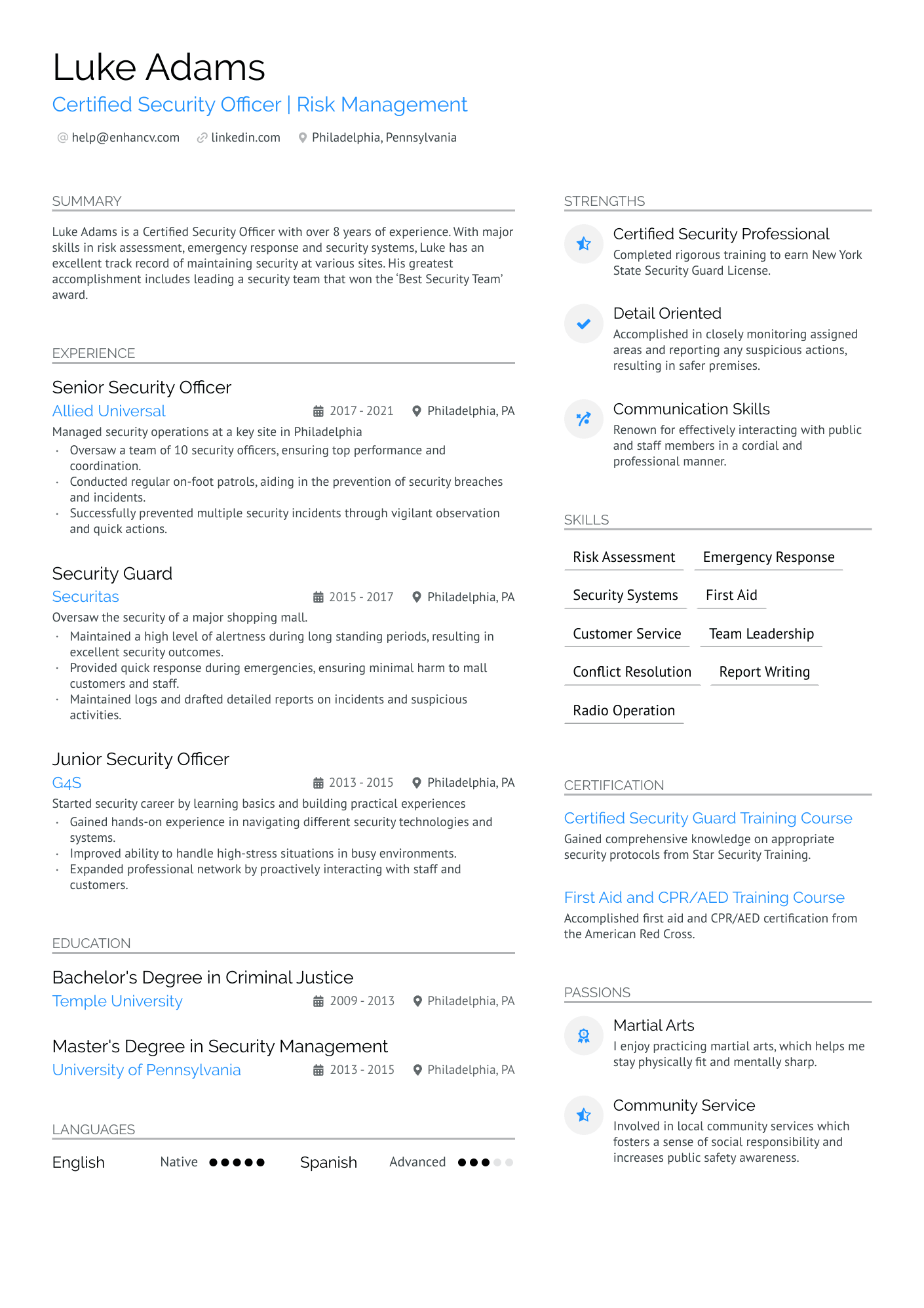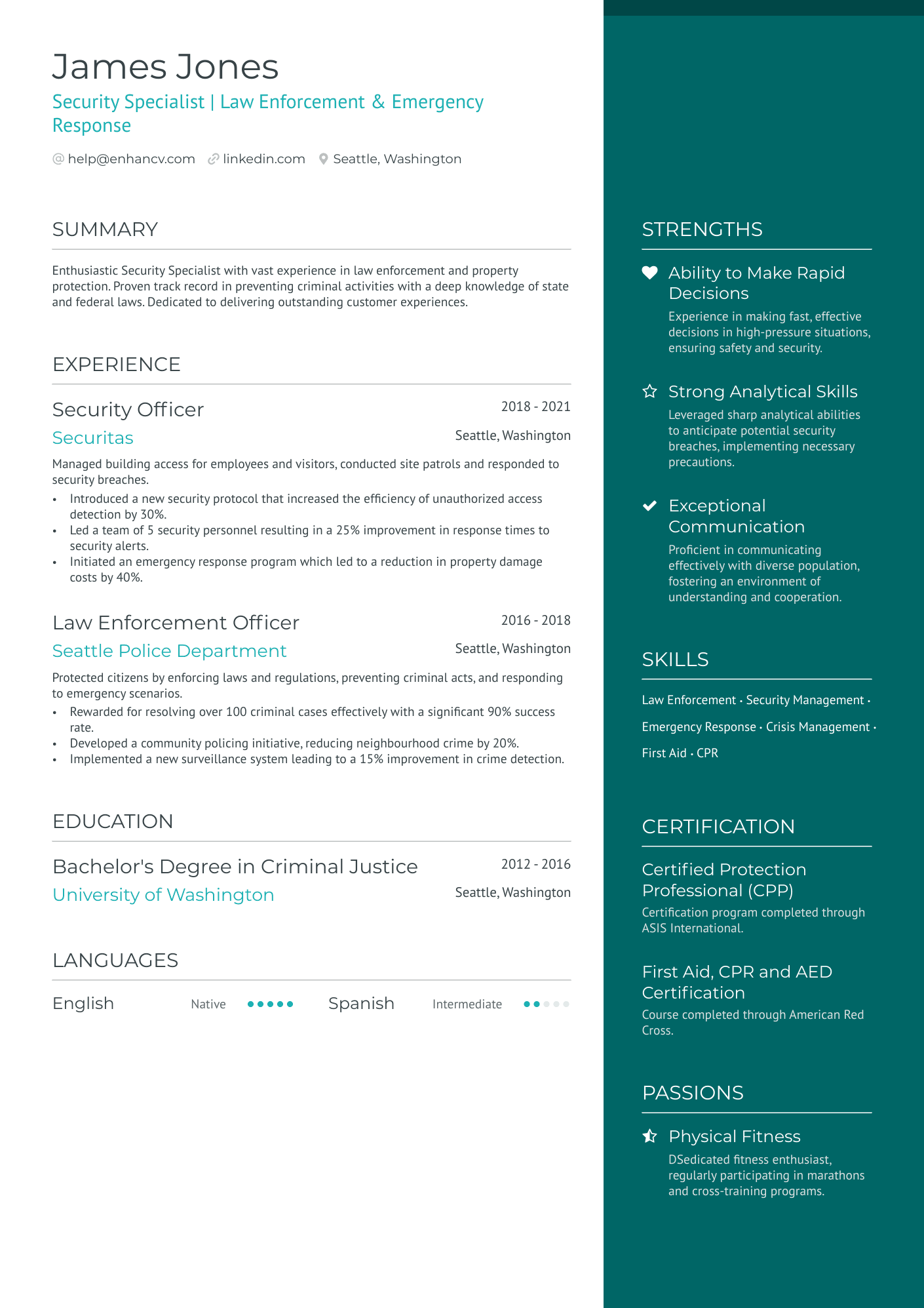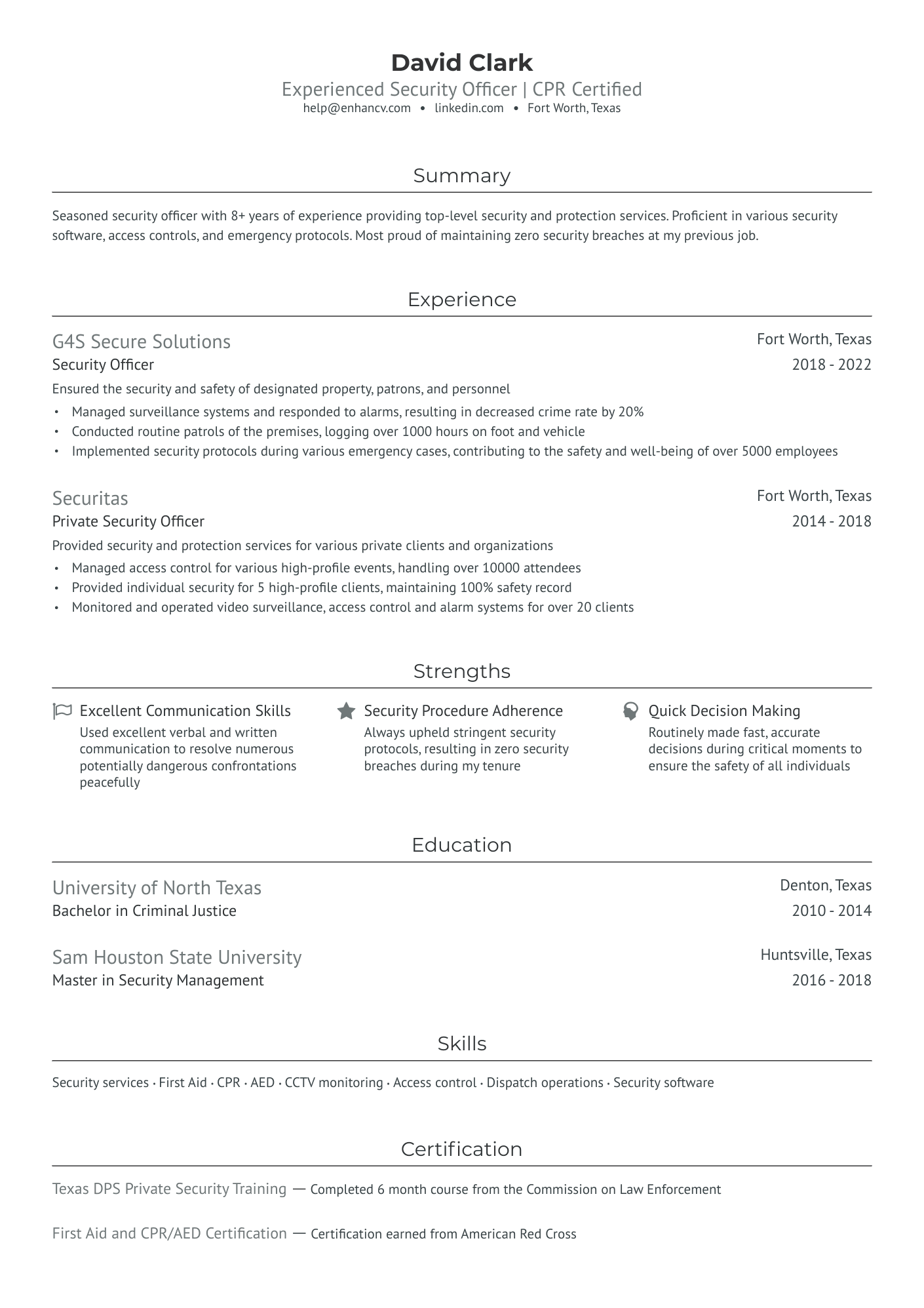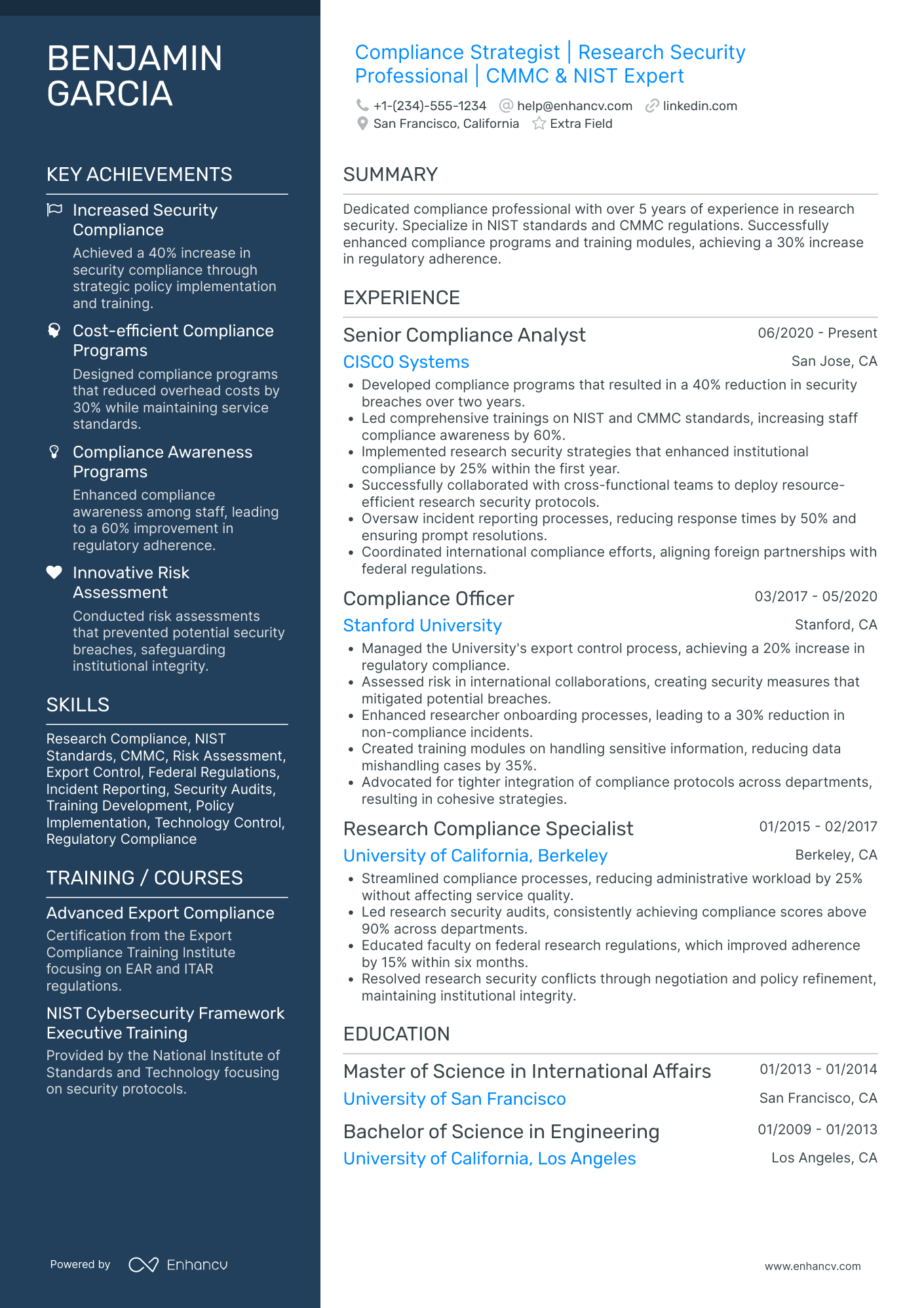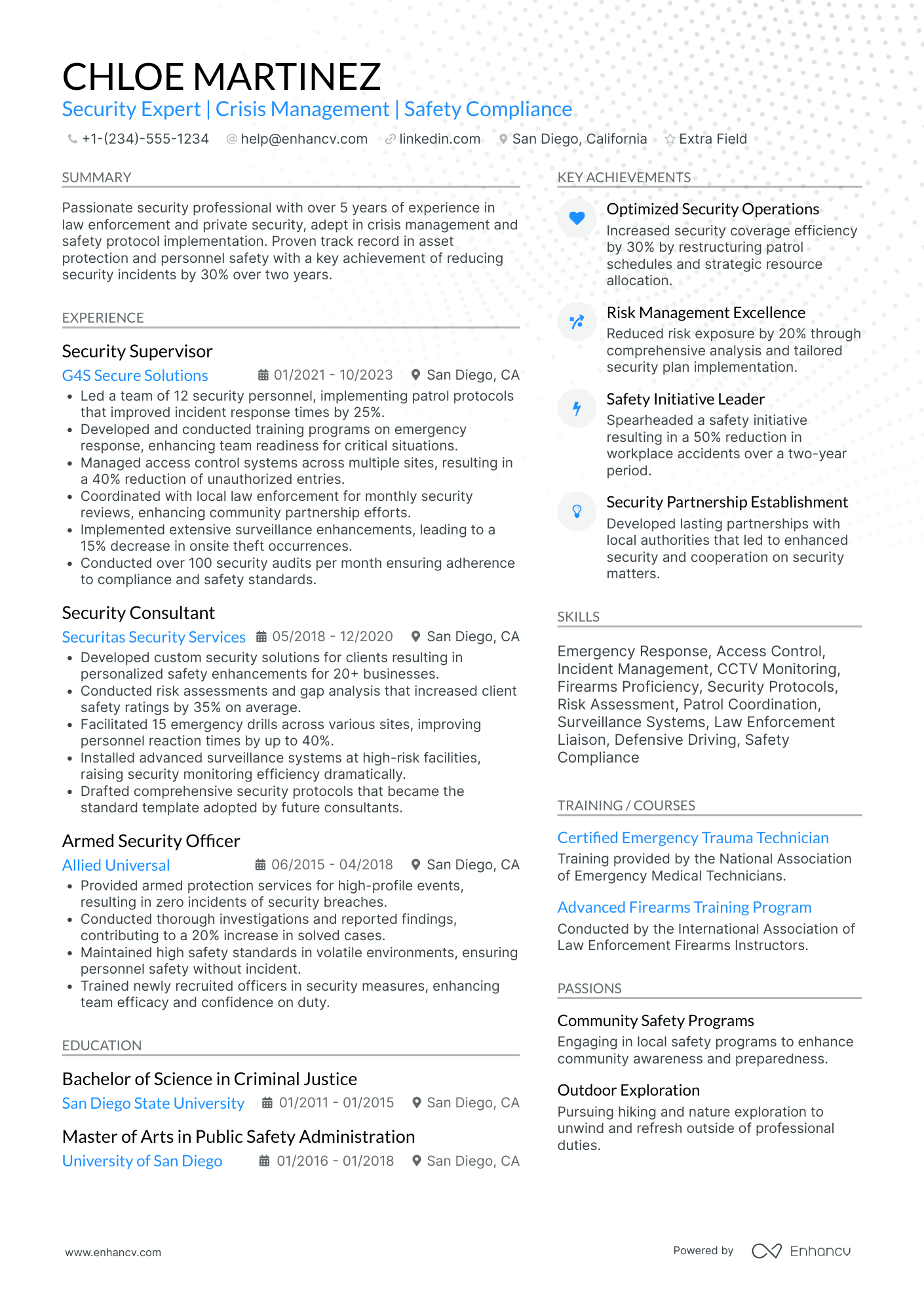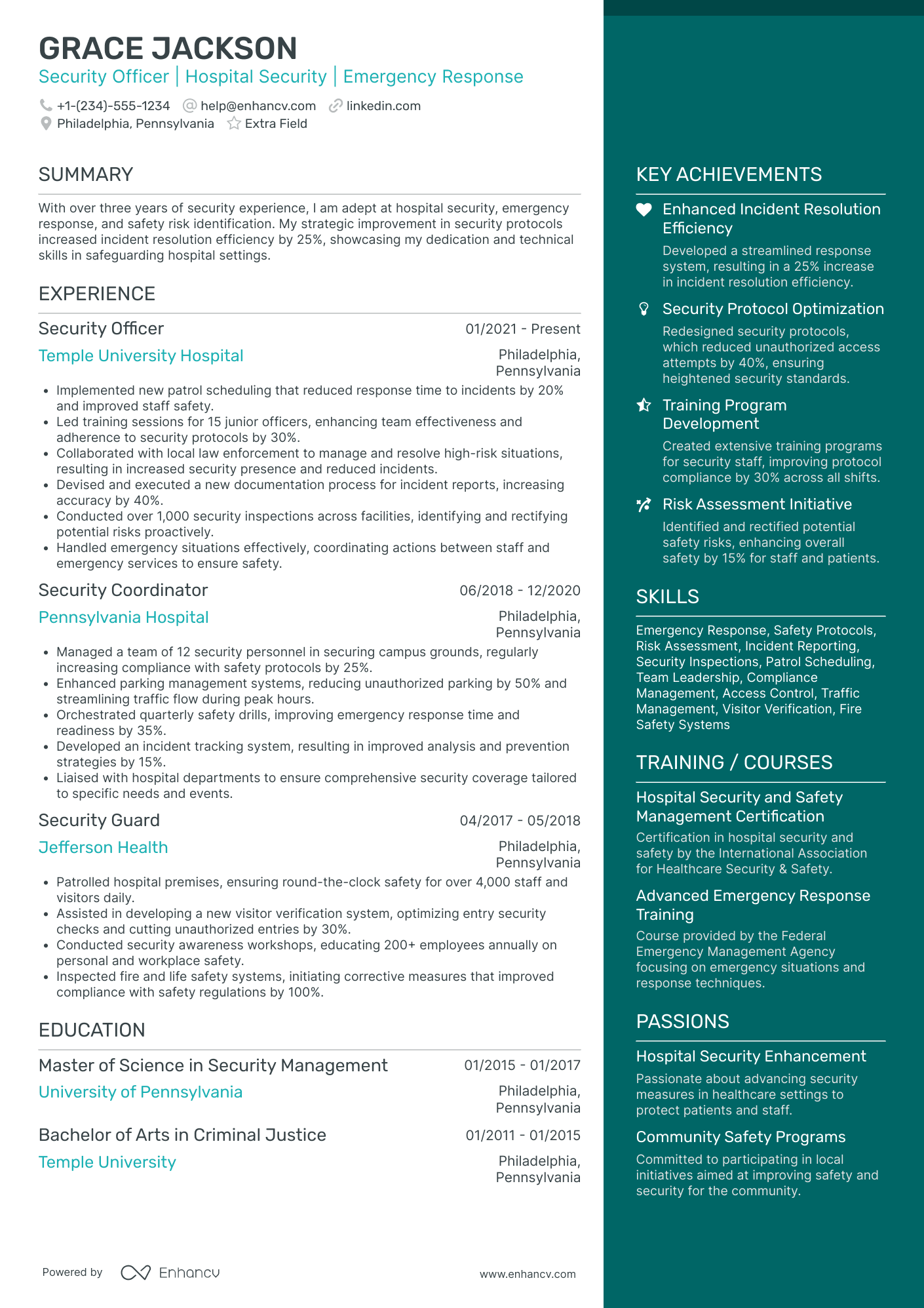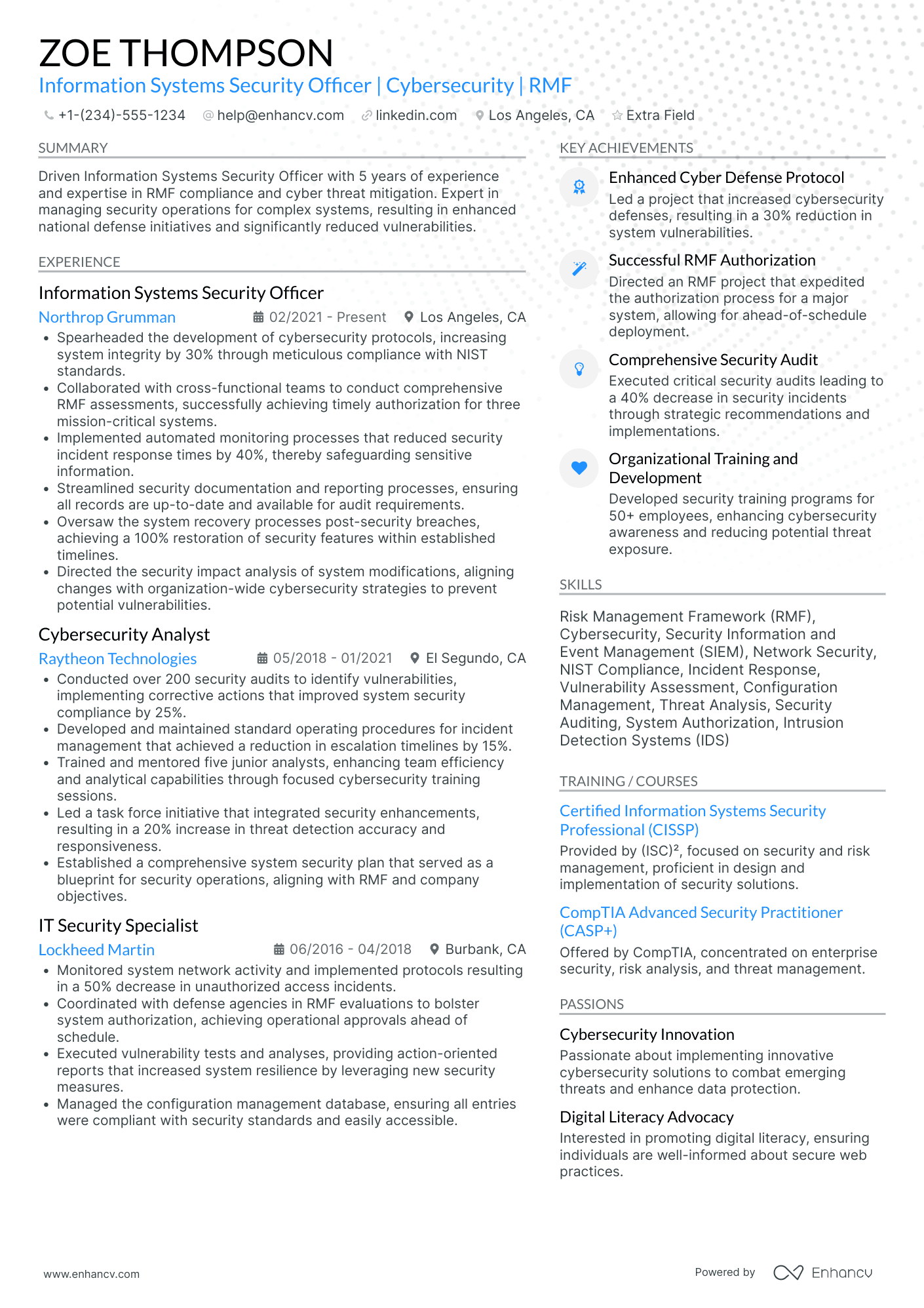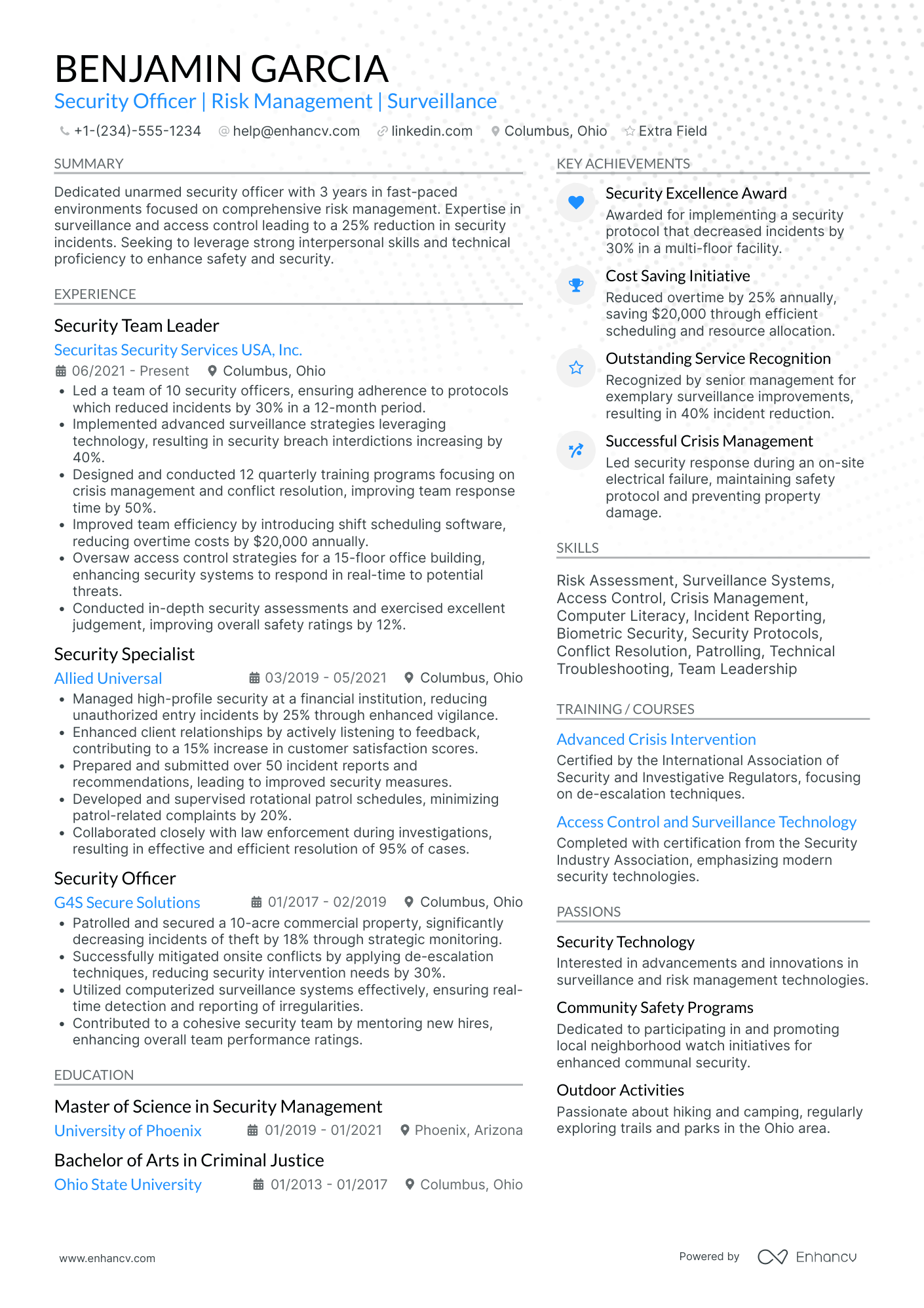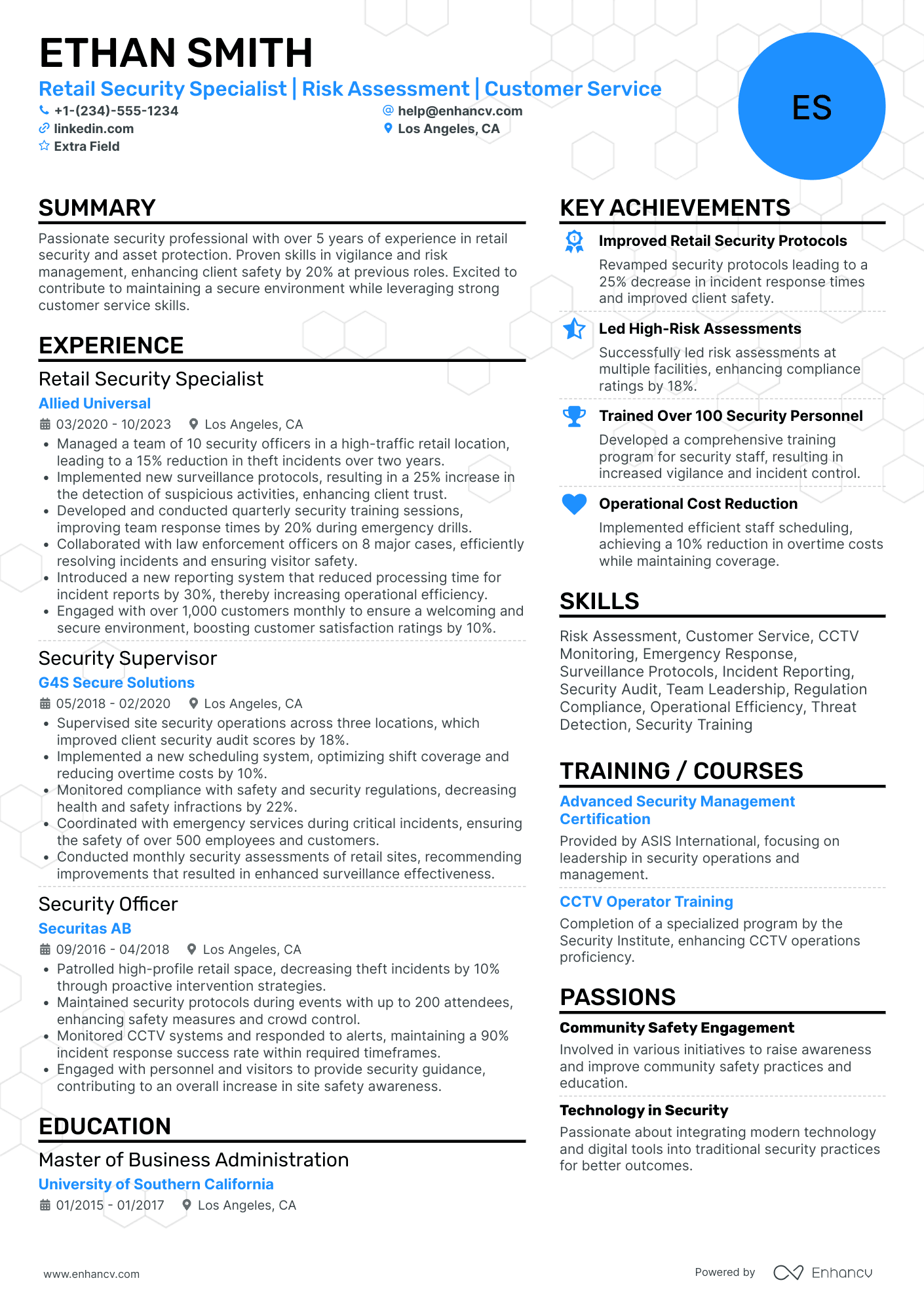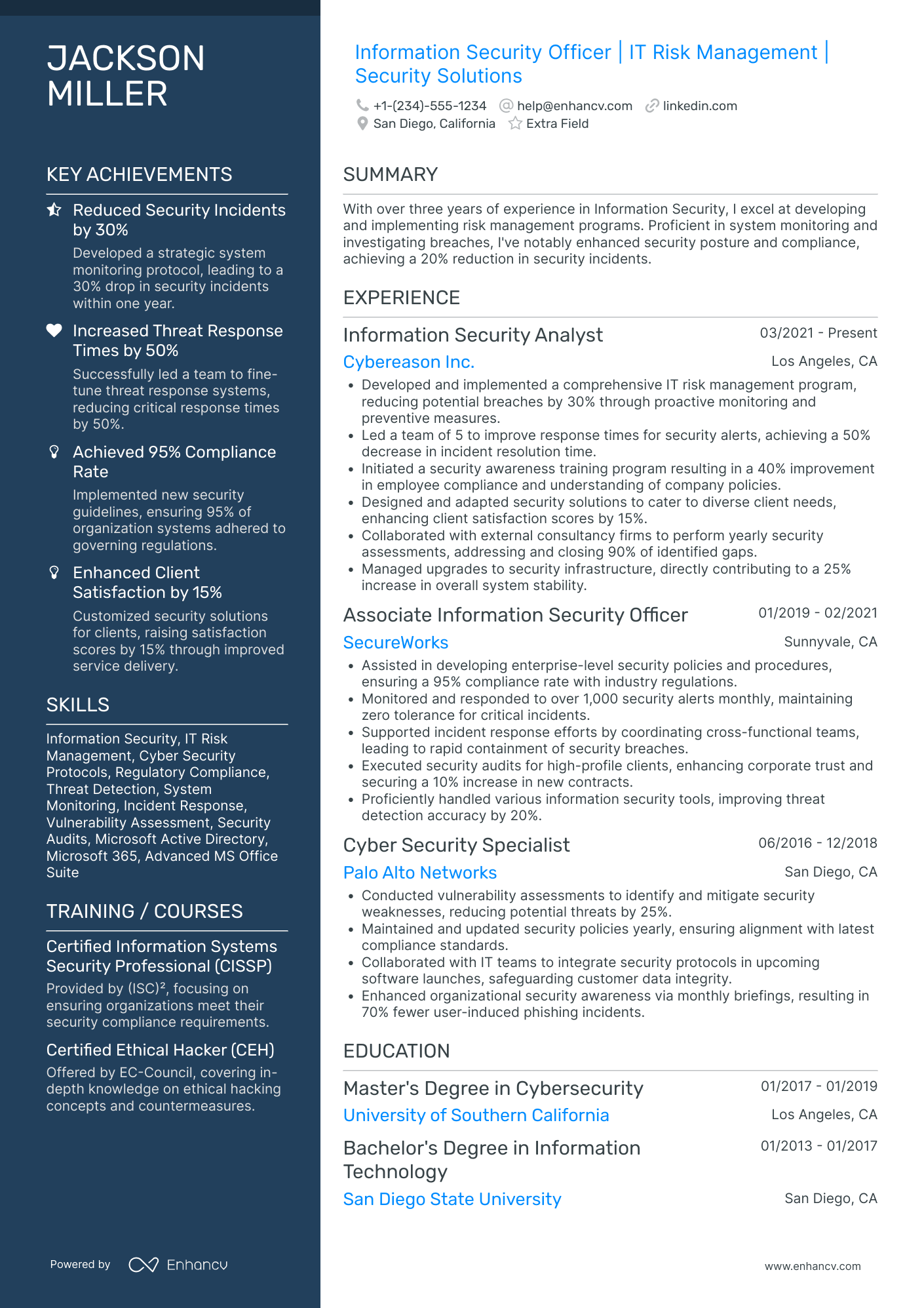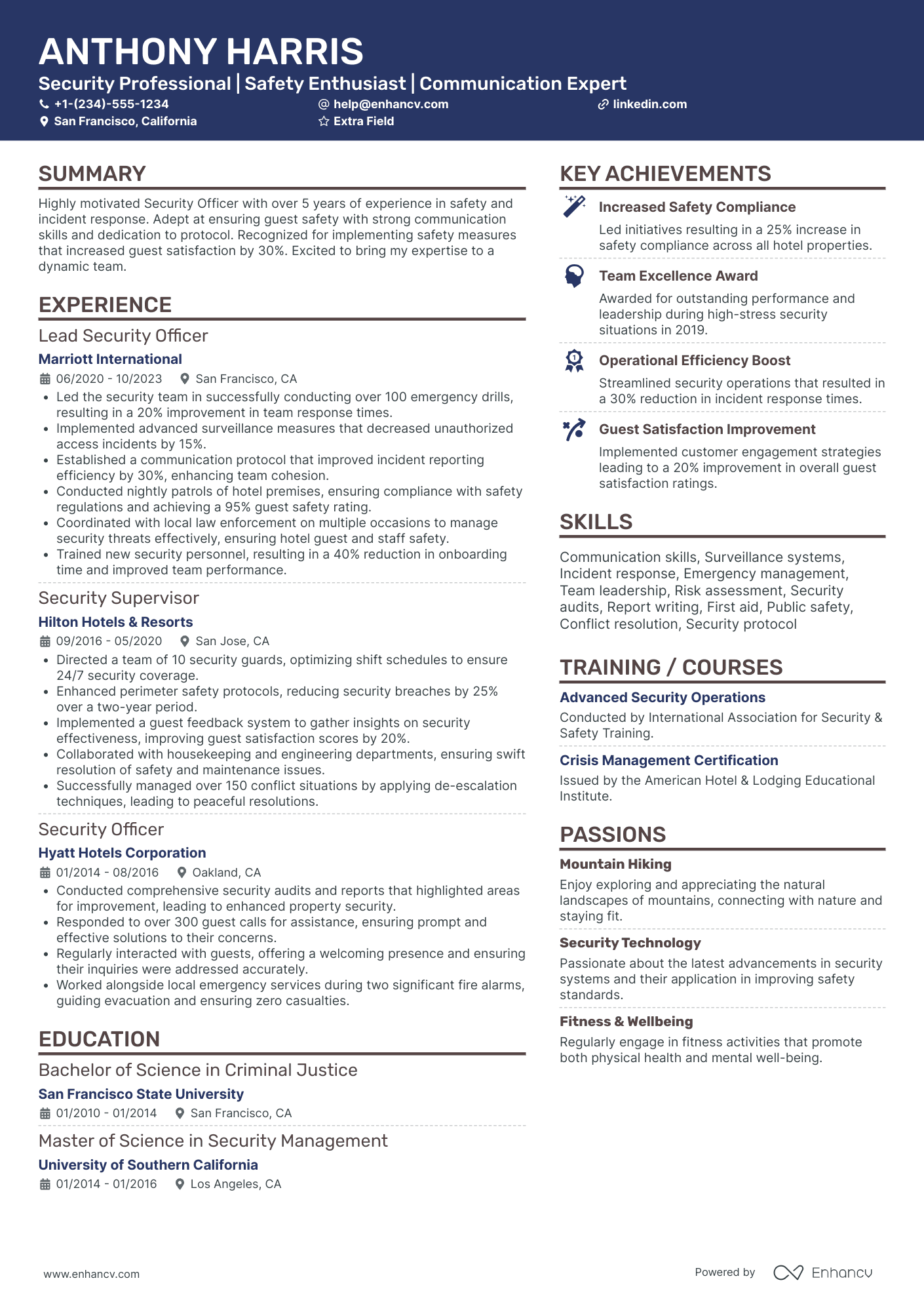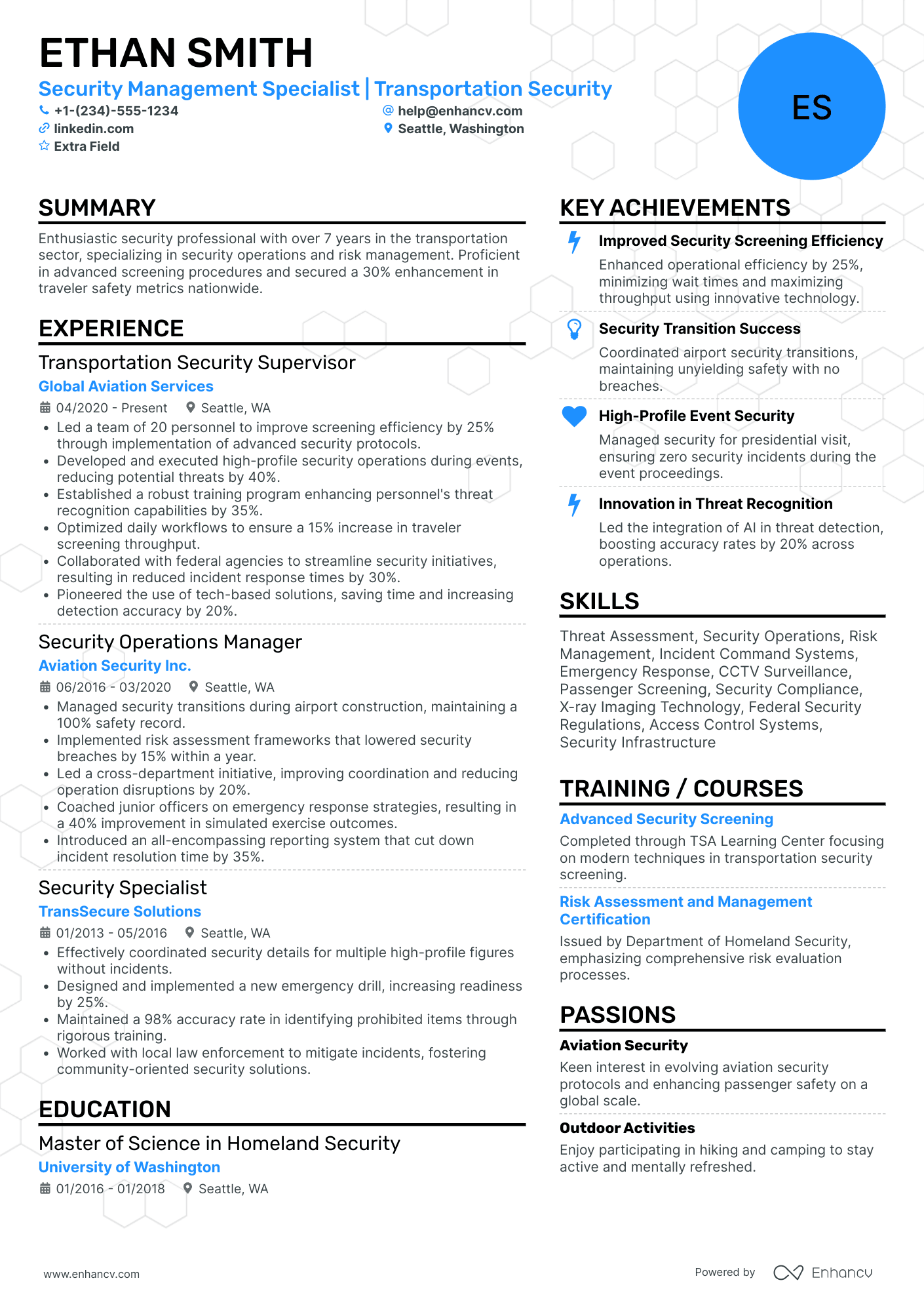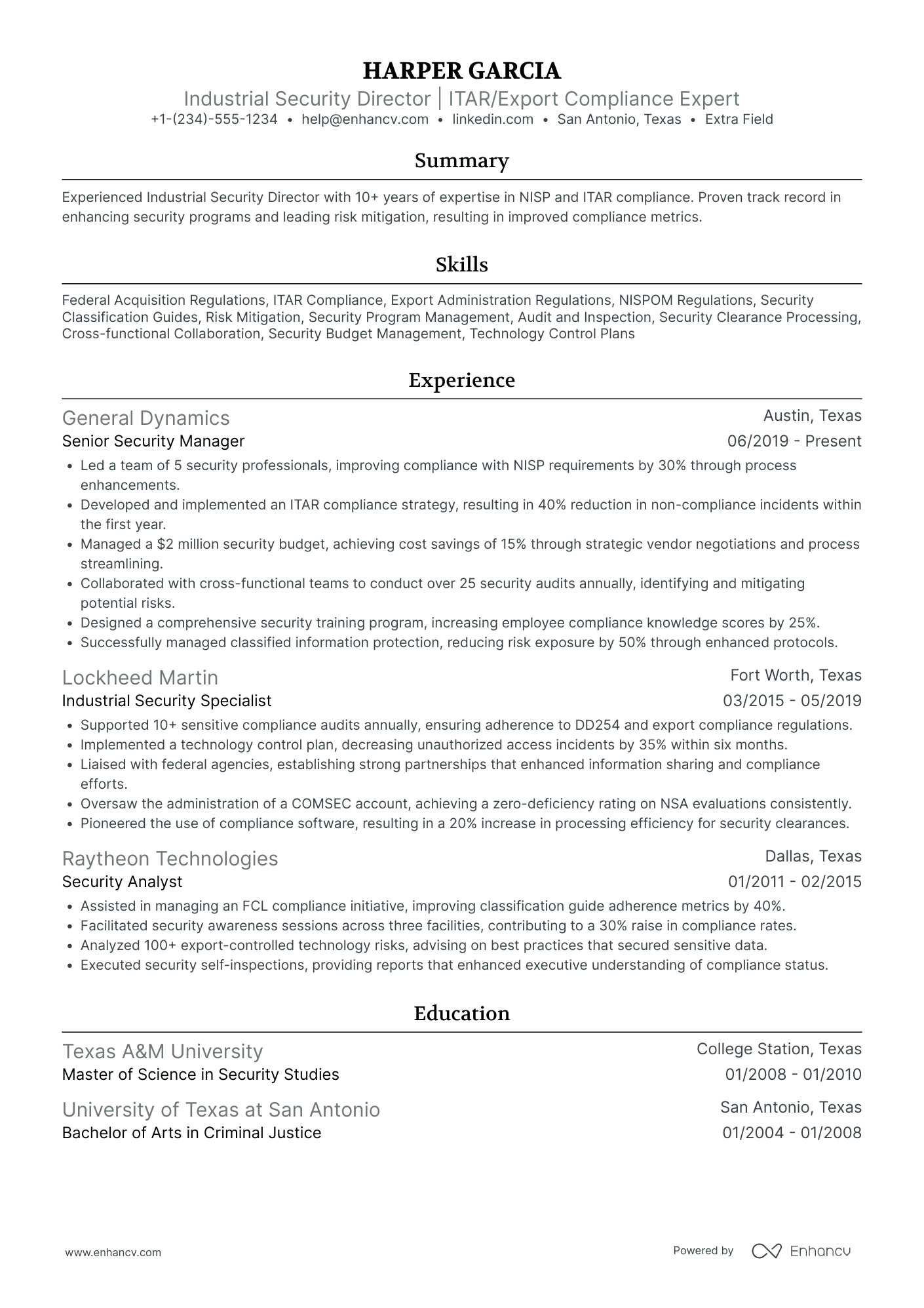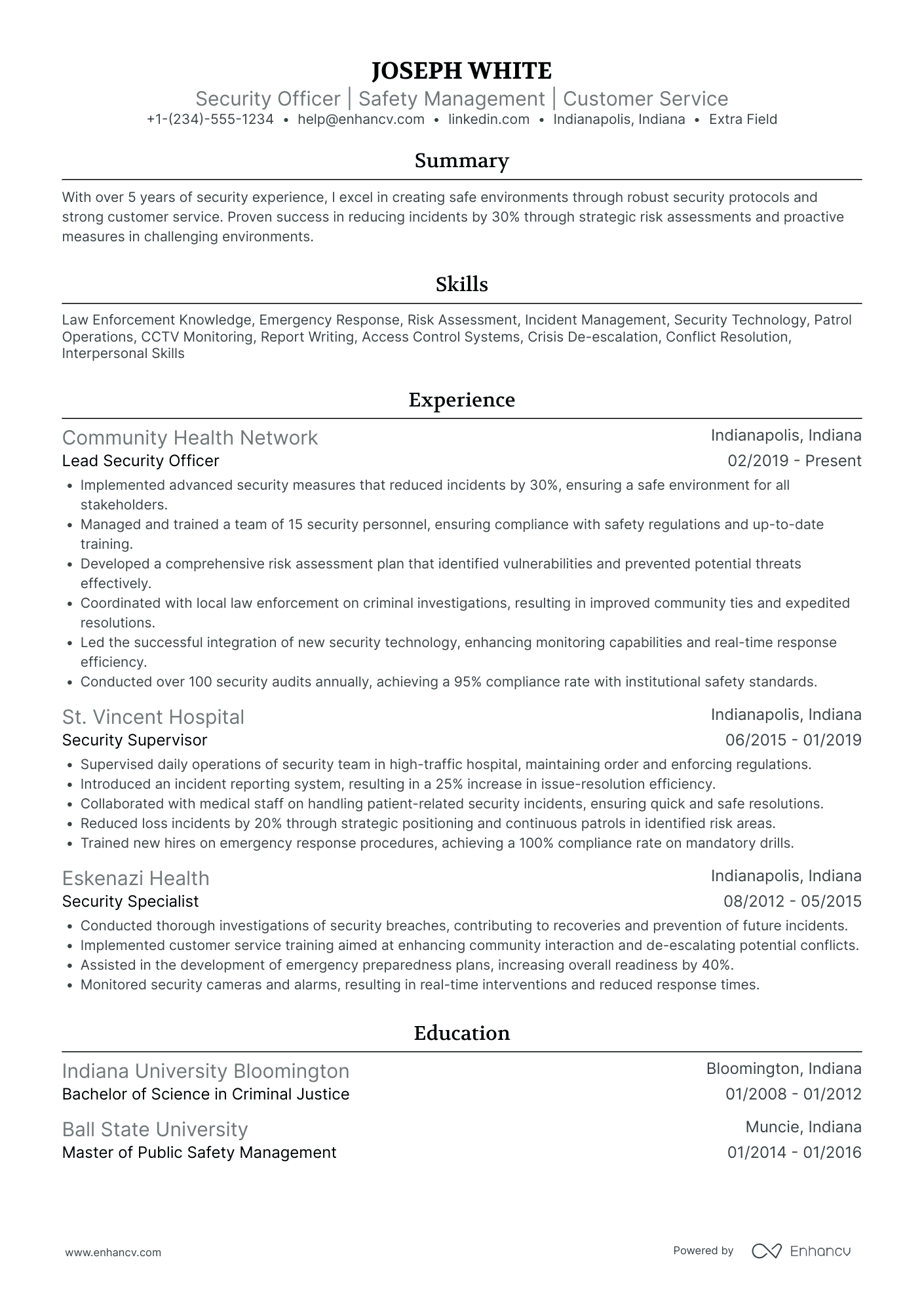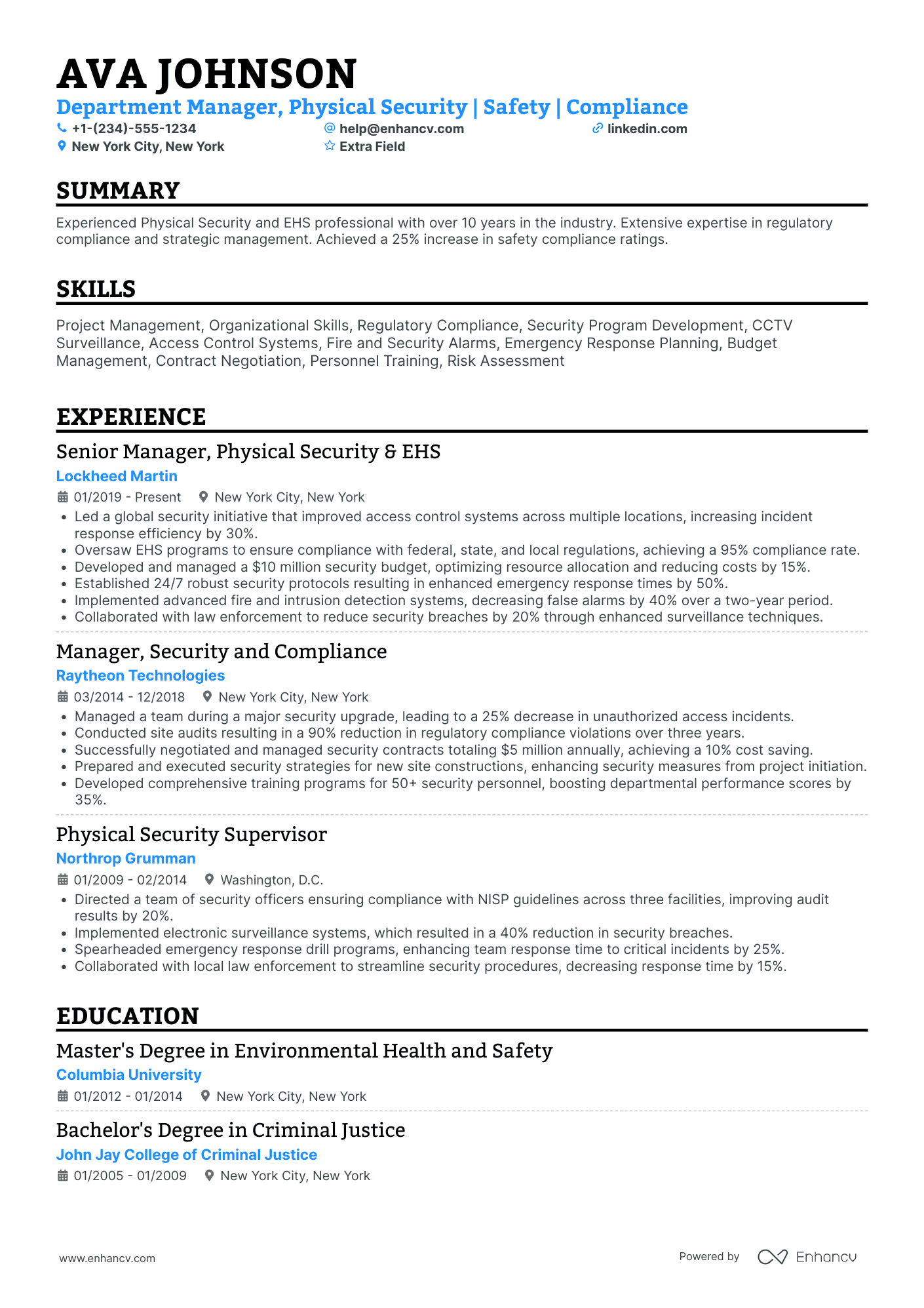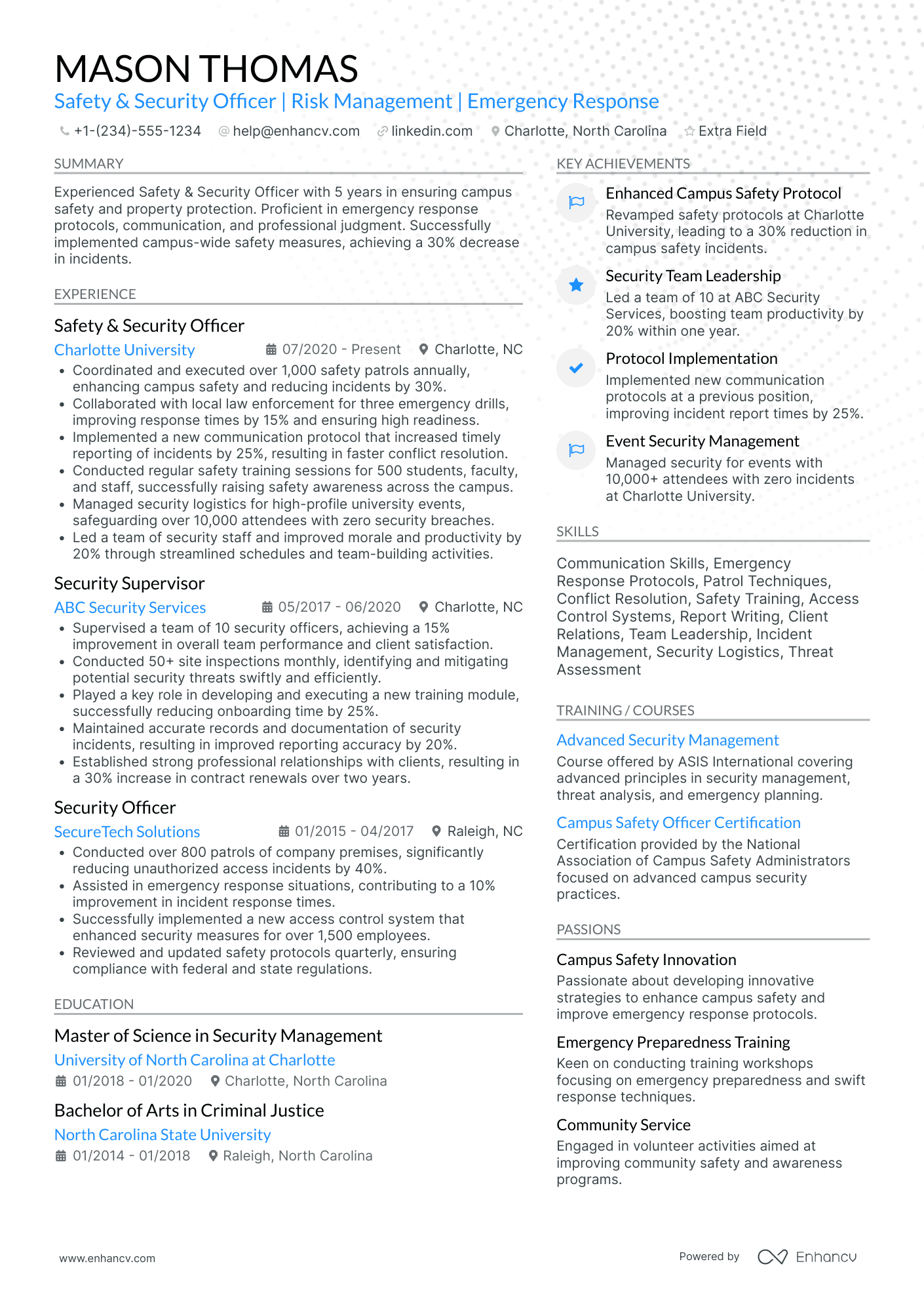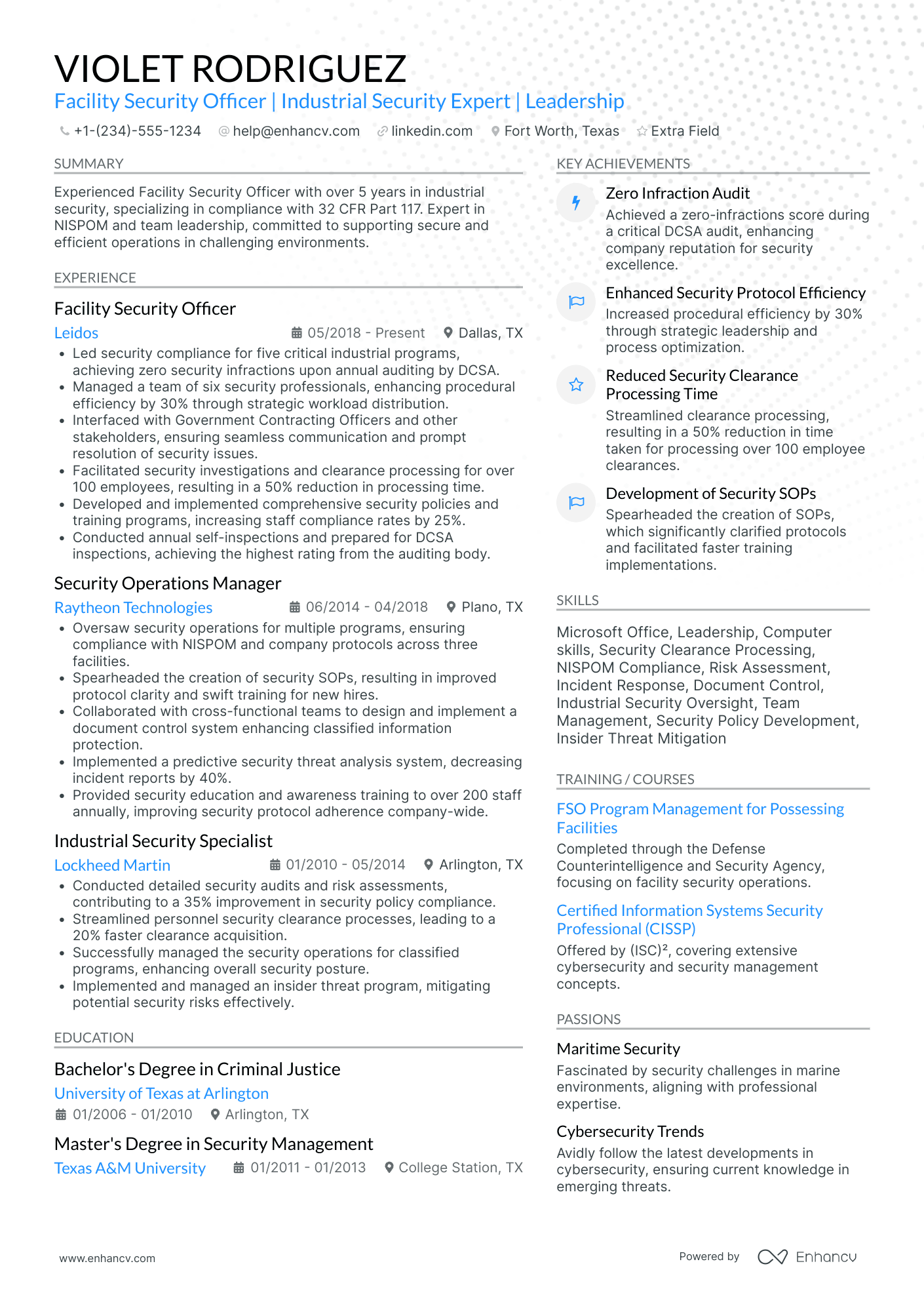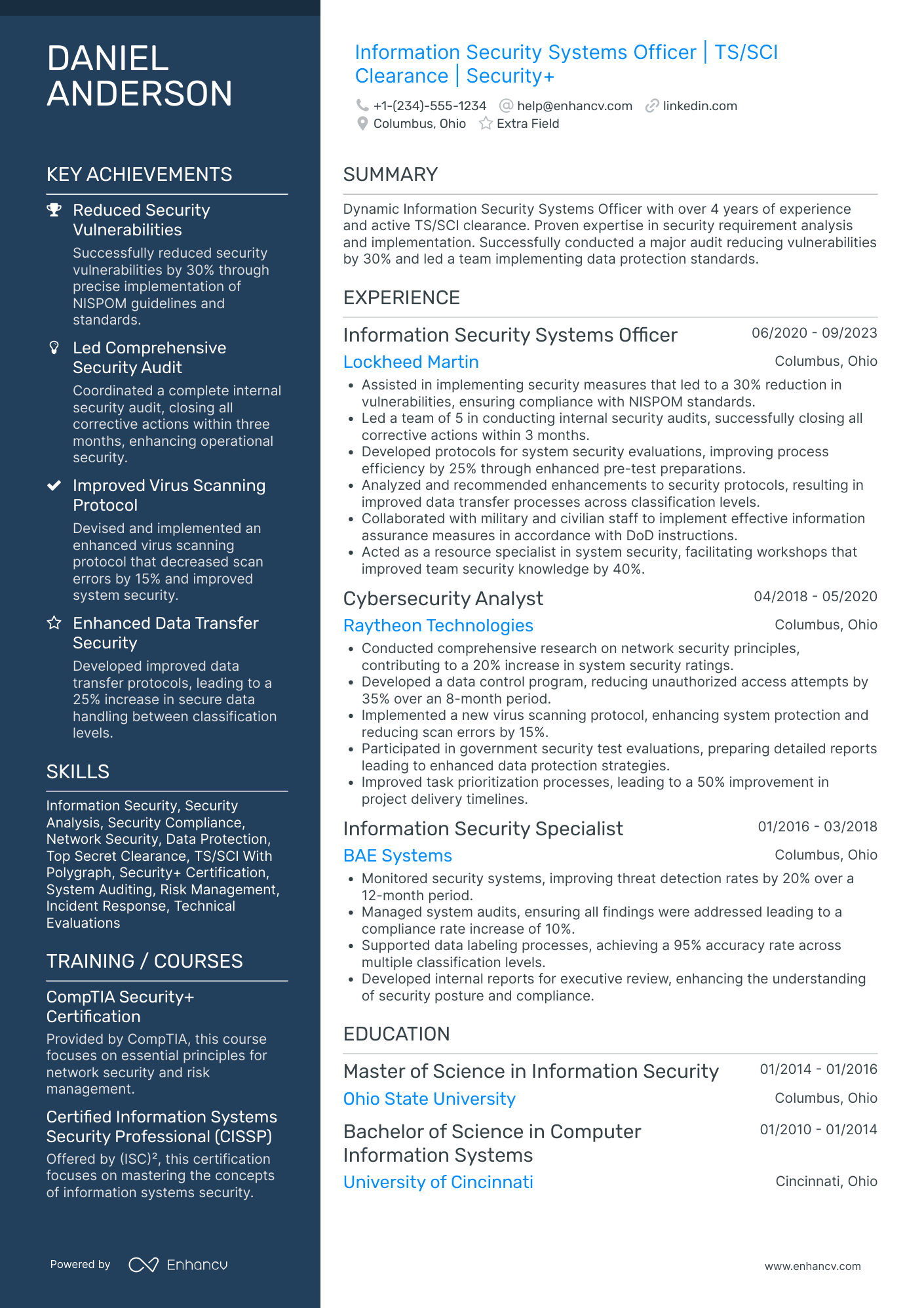As a security officer, articulating the breadth of your experience in risk assessment and emergency response on your resume can be challenging. Our guide offers clear strategies to help you effectively highlight your skills and demonstrate your value to potential employers in a concise and powerful manner.
- Security officer resume samples that got people hired at top companies.
- How to perfect the look-and-feel of your resume layout.
- How to showcase your achievements and skills through various resume sections.
- How you could hint to recruiters why your resume is the ideal profile for the job.
If the security officer resume isn't the right one for you, take a look at other related guides we have:
Professional security officer resume format advice
Achieving the most suitable resume format can at times seem like a daunting task at hand.
Which elements are most important to recruiters?
In which format should you submit your resume?
How should you list your experience?
Unless specified otherwise, here's how to achieve a professional look and feel for your resume.
- Present your experience following the reverse-chronological resume format . It showcases your most recent jobs first and can help recruiters attain a quick glance at how your career has progressed.
- The header is the must-have element for your resume. Apart from your contact details, you could also include your portfolio and a headline, that reflects on your current role or a distinguishable achievement.
- Select relevant information to the role, that should encompass no more than two pages of your resume.
- Download your resume in PDF to ensure that its formatting stays intact.
Think about the market’s preferences – a Canadian resume, for instance, could have a different layout.
Upload & Check Your Resume
Drop your resume here or choose a file. PDF & DOCX only. Max 2MB file size.
PRO TIP
If you happen to have some basic certificates, don't invest too much of your security officer resume real estate in them. Instead, list them within the skills section or as part of your relevant experience. This way you'd ensure you meet all job requirements while dedicating your certificates to only the most in-demand certification across the industry.
Don't forget to include these six sections on your security officer resume:
- Header and summary for your contact details and to highlight your alignment with the security officer job you're applying for
- Experience section to get into specific technologies you're apt at using and personal skills to deliver successful results
- Skills section to further highlight how your profile matches the job requirements
- Education section to provide your academic background
- Achievements to mention any career highlights that may be impressive, or that you might have missed so far in other resume sections
What recruiters want to see on your resume:
- Proven experience in law enforcement, military, or security work
- Familiarity with security equipment and technology (e.g., surveillance cameras, access control systems)
- Knowledge of security protocols and procedures
- Physical fitness and the ability to respond appropriately to emergency situations
- Certifications relevant to security roles, such as a CPR certification or a Security Guard license
The experience section or the essence of your professional security officer resume
Recruiters always have and always will appreciate well-written security officer resume experience sections.
The experience section is perhaps the most crucial element of your professional presentation, as it needs to answer job requirements while showcasing your technical expertise and personality.
Create your best resume experience section yet by:
- Selecting only relevant experience items to the role you're applying for;
- Always ensure you've listed a metric to quantify your success alongside each experience item;
- Create a narrative that showcases your security officer career succession: this goes to show the time and effort you've invested in the field to build your experience from the ground up;
- Within each experience bullet, consider a problem you've solved, the skills you've used, and the bigger impact this has made in the organization.
Take a look at how other real-life professionals have curated their experience with the security officer samples below:
- Oversaw a team of 12 security personnel, developing comprehensive patrol strategies that minimized incident rates by 30%.
- Implemented a new surveillance system integrating the latest camera and sensor technology, improving detection and response time by 25%.
- Collaborated with local law enforcement to design and conduct quarterly security audits, enhancing the overall security posture of the facility.
- Managed access control systems for a high-security building, ensuring 100% compliance with federal identification standards.
- Developed and led security training for over 50 new hires, focusing on crisis management and emergency evacuation procedures.
- Coordinated with the IT department to counteract a major cyber threat, preventing potential data breaches.
- Acted as primary security liaison during major events, coordinating teams that safely managed crowds surpassing 10,000 attendees.
- Identified a critical gap in perimeter security, leading to the deployment of additional patrols and fencing, effectively reducing unauthorized entries by 40%.
- Trained in advanced conflict resolution techniques, successfully deescalating over 200 potentially volatile situations without resorting to physical force.
- Performed regular risk assessments on physical and digital security measures, which resulted in upgrading the surveillance system, mitigating risks by 35%.
- Spearheaded the implementation of an RFID badge system that cut down unauthorized access incidents by 50%.
- Assisted in revising and updating the company-wide emergency response plan, increasing staff readiness and reducing response time during drills by 20%.
- Managed the transition to a digital logging system, enhancing report accuracy and reducing incident report filing times by 60%.
- Directed a successful pilot program for mobile patrols using electric vehicles, which cut costs by 15% and lowered the carbon footprint of security operations.
- Functioned as the first responder to emergencies within a 10-acre facility, maintaining an impeccable record of swift and effective incident management.
- Coordinated closely with the National Threat Assessment Center, enhancing the intelligence-gathering process that reduced the threat profile by 20%.
- Implemented continuous security training modules, achieving a 95% pass rate among team members which enhanced the overall situational awareness.
- Handled sensitive information and materials in a secure government facility with zero security lapses or breaches over a four-year tenure.
- Developed a visitor management system that streamlined check-in processes, improving efficiency by 35%, and enhancing visitor experience.
- Conducted thorough investigations into security incidents, resolving over 300 cases while maintaining confidentiality and professionalism.
- Leveraged networked communication systems to quickly respond to alarms and emergencies, leading to a 100% success rate in threat neutralization.
- Oversaw the implementation of a state-of-the-art command center, which improved incident management and response coordination by 40%.
- Developed joint training programs with fire and EMS departments, enhancing inter-agency collaboration during emergencies.
- Managed a large-scale security detail for an international conference, ensuring the safety of over 500 VIPs with zero security incidents reported.
The following content includes information from "O*NET OnLine" by the U.S. Department of Labor, Employment and Training Administration (USDOL/ETA). Used under the CC BY 4.0 license. The data represents the top responsibilities present on the task lists for security officer professionals.
Top Responsibilities for Security Officer:
- Screen persons entering courthouse using magnetometers, x-ray machines, and other devices to collect and retain unauthorized firearms and other contraband.
- Escort prisoners to and from courthouse and maintain custody of prisoners during court proceedings.
- Maintain order in courtroom during trial and guard jury from outside contact.
- Provide security by patrolling interior and exterior of courthouse and escorting judges and other court employees.
- Guard lodging of sequestered jury.
- Enforce courtroom rules of behavior and warn persons not to smoke or disturb court procedure.
- Arrest persons in court when arrest warrants have been issued.
- Report need for police or medical assistance to sheriff's office.
- Check courtroom for security and cleanliness and assure availability of sundry supplies, such as notepads, for use by judge, jurors, and attorneys.
- Stop people from entering courtroom while judge charges jury.
Quantifying impact on your resume
- Include the number of patrol routes managed daily to demonstrate the scale of your responsibility and time management ability.
- Specify the percentage by which you reduced security incidents, indicating effectiveness in risk mitigation.
- List the exact number of surveillance systems you are proficient with to showcase your technical skills.
- Detail the size of the team you've led or coordinated to highlight leadership and communication skills.
- Mention the number of security audits or compliance checks you have completed to show your thoroughness and attention to detail.
- Quantify the amount of training hours you've completed to exemplify your commitment to continuous professional development.
- Report the volume of incident reports filed to reveal your experience and ability to handle security events.
- State the number of emergency response procedures you are trained in to underscore your readiness and versatility.
Action verbs for your security officer resume
How to shift the focus from your security officer resume experience section to your professional profile
If you're at the start of your career journey or transitioning industries, you might be concerned about the lack of professional experience while crafting your security officer resume.
How can you effectively present your security officer resume experience section under these circumstances?
Rather than a traditional, extensive experience section, demonstrate your expertise through:
- Emphasizing your education. Your academic background might impress recruiters, especially if it includes recent, industry-relevant knowledge;
- Creating a compelling objective statement. The first few sentences of your resume should map out your motivations and career aspirations, offering insight into your goals;
- Highlighting your transferable skills. For example, if you've honed communication skills through volunteering, illustrate on your security officer resume how these can benefit a potential employer;
- Detailing your technical background in certifications and skills sections. As a recent graduate, your technological foundations might be particularly attractive to employers looking to develop these skills further.
It's important to remember that employers sometimes prefer candidates with less experience but who are a better cultural fit for their organization.
Recommended reads:
PRO TIP
List all your relevant higher education degrees within your resume in reverse chronological order (starting with the latest). There are cases when your PhD in a particular field could help you stand apart from other candidates.
How to showcase hard skills and soft skills on your resume
Reading between the lines of your dream job, you find recruiters are looking for candidates who have specific software or hardware knowledge, and personal skills.
Any technology you're adept at shows your hard skills. This particular skill set answers initial job requirements, hinting at how much time your potential employers would have to invest in training you. Showcase you have the relevant technical background in your communicate, solve problems, and adapt to new environments. Basically, your interpersonal communication skills that show recruiters if you'd fit into the team and company culture. You could use the achievements section to tie in your greatest wins with relevant soft skills.
It's also a good idea to add some of your hard and soft skills across different resume sections (e.g. summary/objective, experience, etc.) to match the job requirements and pass the initial screening process. Remember to always check your skill spelling and ensure that you've copy-pasted the name of the desired skills from the job advert as is.
Top skills for your security officer resume:
Surveillance Systems Operation
Access Control Systems
Emergency Response Planning
Incident Report Writing
Security Patrol Procedures
Physical Security Systems
Fire Safety and Prevention
Conflict Resolution Techniques
First Aid and CPR Certification
CCTV Monitoring
Communication Skills
Attention to Detail
Observational Skills
Problem-Solving Skills
Interpersonal Skills
Decision-Making Skills
Teamwork and Collaboration
Stress Management
Customer Service Orientation
Adaptability
Next, you will find information on the top technologies for security officer professonals from "O*NET OnLine" by the U.S. Department of Labor, Employment and Training Administration (USDOL/ETA). Used under the CC BY 4.0 license.
Top technologies for Security Officer’s resume:
- Microsoft Access
- National Crime Information Center (NCIC) database
- Microsoft PowerPoint
- Email software
- Microsoft Outlook
PRO TIP
List all your relevant higher education degrees within your resume in reverse chronological order (starting with the latest). There are cases when your PhD in a particular field could help you stand apart from other candidates.
Security officer-specific certifications and education for your resume
Place emphasis on your resume education section . It can suggest a plethora of skills and experiences that are apt for the role.
- Feature only higher-level qualifications, with details about the institution and tenure.
- If your degree is in progress, state your projected graduation date.
- Think about excluding degrees that don't fit the job's context.
- Elaborate on your education if it accentuates your accomplishments in a research-driven setting.
On the other hand, showcasing your unique and applicable industry know-how can be a literal walk in the park, even if you don't have a lot of work experience.
Include your accreditation in the certification and education sections as so:
- Important industry certificates should be listed towards the top of your resume in a separate section
- If your accreditation is really noteworthy, you could include it in the top one-third of your resume following your name or in the header, summary, or objective
- Potentially include details about your certificates or degrees (within the description) to show further alignment to the role with the skills you've attained
- The more recent your professional certificate is, the more prominence it should have within your certification sections. This shows recruiters you have recent knowledge and expertise
At the end of the day, both the education and certification sections hint at the initial and continuous progress you've made in the field.
And, honestly - that's important for any company.
Below, discover some of the most recent and popular security officer certificates to make your resume even more prominent in the applicant pool:
The top 5 certifications for your security officer resume:
- Certified Protection Professional (CPP) - ASIS International
- Certified Information Systems Security Professional (CISSP) - (ISC)²
- Physical Security Professional (PSP) - ASIS International
- Security Guard License - Varies by region/country (not a named institution)
- Professional Certified Investigator (PCI) - ASIS International
The content below includes information from "O*NET OnLine" by the U.S. Department of Labor, Employment and Training Administration (USDOL/ETA). Used under the CC BY 4.0 license. The data represents the top associations for security officer professionals.
Top US associations for a Security Officer professional
- Fraternal Order of Police
- International Association of Directors of Law Enforcement Standards and Training
- National Association for Court Management
- National Sheriffs' Association
- United States Deputy Sheriffs' Association
PRO TIP
Mention specific courses or projects that are pertinent to the job you're applying for.
Recommended reads:
Professional summary or objective for your security officer resume
security officer candidates sometimes get confused between the difference of a resume summary and a resume objective.
Which one should you be using?
Remember that the:
- Resume objective has more to do with your dreams and goals for your career. Within it, you have the opportunity to showcase to recruiters why your application is an important one and, at the same time, help them imagine what your impact on the role, team, and company would be.
- Resume summary should recount key achievements, tailored for the role, through your career. Allowing recruiters to quickly scan and understand the breadth of your security officer expertise.
The resume objectives are always an excellent choice for candidates starting off their career, while the resume summary is more fitting for experienced candidates.
No matter if you chose a summary or objective, get some extra inspiration from real-world professional security officer resumes:
Resume summaries for a security officer job
- With over 10 years of dedicated experience in high-security environments, this seasoned security officer boasts exemplary skills in risk assessment, surveillance operations, and crisis management. Having led a 20-person team to success in securing a multinational corporation headquarters, the candidate's track record reflects exceptional strategic planning abilities and a solid commitment to enforcing security protocols.
- As a former law enforcement professional with 8 years of experience transitioning into the private security sector, this security officer brings to the table advanced expertise in investigative techniques, public safety, and conflict de-escalation. Recognized for courage and integrity, they played a pivotal role in coordinating a city-wide emergency response plan, demonstrating outstanding leadership under pressure.
- Adept at swiftly adapting to new technological and procedural developments in security, this IT specialist with 12 years of cybersecurity experience is pivoting to physical security management. Combining technical proficiency with a keen sense of analytical problem-solving, they significantly enhanced their previous company's data protection systems, thwarting a series of high-level cyber-attacks.
- Eager to leverage a robust military background of 15 years towards a career in corporate security, this individual is equipped with a profound knowledge of tactical defense strategies and state-of-the-art security systems. They have been commended for outstanding performance in developing and implementing training programs that substantially increased the preparedness of their unit.
- Seeking to apply my zeal for security management and a Bachelor's degree in Criminal Justice to embark upon a dynamic career in the security field. Driven by a strong personal code of ethics and an eagerness to acquire on-the-job expertise, I am enthusiastic about contributing to a secure working environment through diligence and a steadfast approach to learning.
- Aspiring to harness a deep passion for protecting others and a recent diploma in Security and Protection Management, this fervent individual aims to cultivate practical skills within a professional security setting. They are committed to integrating their theoretical knowledge and unwavering attention to detail to become an invaluable asset in maintaining safety and order.
Average salary info by state in the US for security officer professionals
Local salary info for Security Officer.” Source: My Next Move, National Center for O*NET Development. Accessed 10/15/2024
| State | Average Salary (in USD) |
|---|---|
| US National Average | $53,040 |
| California (CA) | $81,920 |
| Texas (TX) | $61,270 |
| Florida (FL) | $60,940 |
| New York (NY) | $78,520 |
| Pennsylvania (PA) | $46,400 |
| Illinois (IL) | $42,910 |
| Ohio (OH) | $51,290 |
| Georgia (GA) | $46,570 |
| North Carolina (NC) | $42,970 |
| Michigan (MI) | $46,970 |
Extra sections to include in your security officer resume
What should you do if you happen to have some space left on your resume, and want to highlight other aspects of your profile that you deem are relevant to the role? Add to your security officer resume some of these personal and professional sections:
- Passions/Interests - to detail how you spend both your personal and professional time, invested in various hobbies;
- Awards - to present those niche accolades that make your experience unique;
- Publications - an excellent choice for professionals, who have just graduated from university or are used to a more academic setting;
- Volunteering - your footprint within your local (or national/international) community.
Key takeaways
- The layout of your resume should take into consideration your professional background while integrating vital sections and design elements;
- Highlight your most pertinent achievements for the role all through different sections;
- Be very specific when selecting your certifications, hard skills, and soft skills to showcase the best of your talents;
- Include within the top one-third of your security officer resume a header and summary to help recruiters understand your experience and allocate your contact details. A skills box is optional, but it will help you align your expertise with the role;
- Detail the full extent of your professional experience with specific bullets that focus on tasks, actions, and outcomes.
Security Officer resume examples
By Experience
Entry-Level Security Officer
Senior Security Officer
Executive Security Officer
Lead Security Officer
Principal Security Officer
By Role
